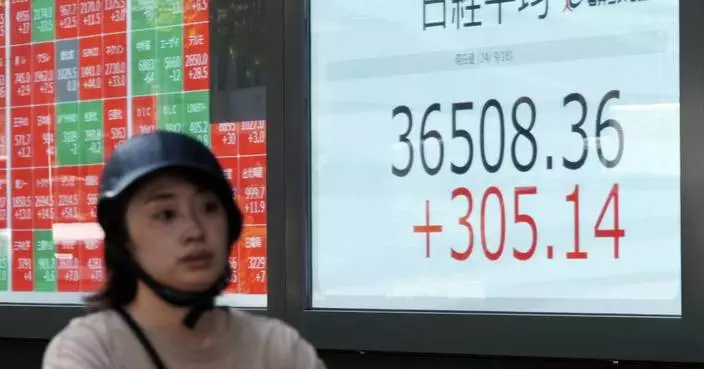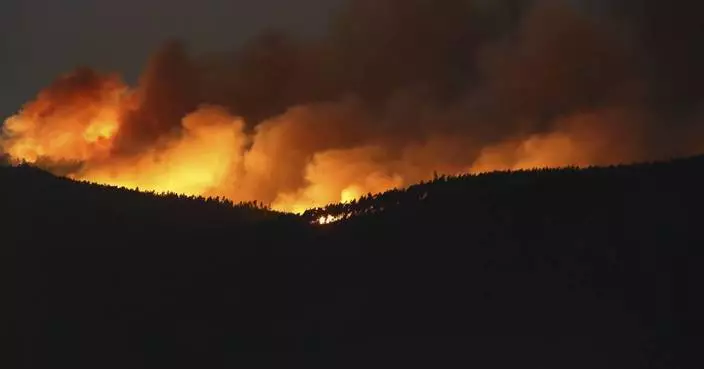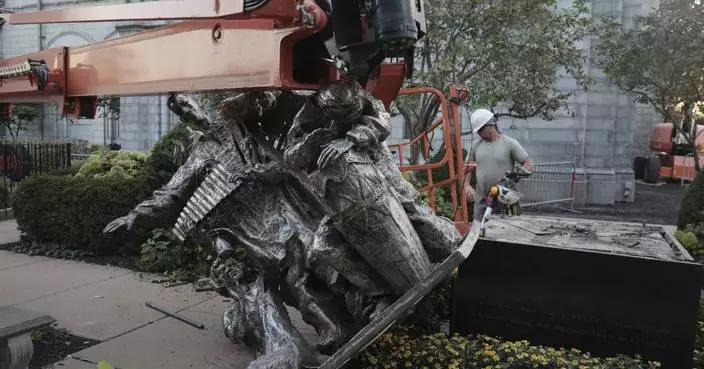NEW YORK (AP) — Hours after an apparent attempt on Donald Trump's life over the weekend, Elon Musk took to his social platform X to post a thinking emoji and a comment that “no one is even trying to assassinate” the Democratic president and vice president.
In the midst of anti-Muslim riots in the U.K. — which were ginned up by a false rumor — Musk declared that "civil war is inevitable" in the country.
And when an anonymous X user distorted data to claim a surge in sketchy voter registrations in three U.S. states, Musk amplified the false post and called it “extremely concerning.”
All three posts sparked quick backlash from public officials who called Musk's words irresponsible and misleading. As his words amass millions of views and thousands of shares, they also illustrate the ability of one of the world's most influential people to spread fear, hate and misinformation during fraught political moments around the world. That's especially true because he owns the social platform that used to be Twitter, giving Musk the authority to shape how its content reaches users.
Musk's inaccurate posts to his 200 million followers along with his site's lack of guardrails are raising concerns about how he could manipulate public trust as Election Day in the U.S. draws nearer. He recently endorsed Trump's presidential bid and has become more personally invested in politics — even agreeing to lead a government efficiency commission if Trump wins reelection.
Trump gave a shoutout to Musk during an event on X Monday evening, basking in the tech billionaire's endorsement and referring to him as his “friend.” Musk did not reply to an emailed request for comment.
At the very least, experts and election officials worry that Musk could influence people to question the legitimacy of the vote. But they also are concerned his words could motivate threats and violence against election workers or candidates.
“X and Musk are raising the temperature of politics dangerously and irresponsibly at a critical moment,” said Heidi Beirich, co-founder of the Global Project Against Hate and Extremism. “It’s shameful.”
The 53-year-old billionaire who bought and transformed Twitter in 2022 has modeled his social media site as a marketplace of ideas where people can speak freely without censorship, a move that has been cheered by many conservatives. He often has touted X as a superior news source to the mainstream media, one where users can post without fear and discern the “truth.”
Yet the changes Musk has made to the company over two years also have allowed false information to spread largely unchecked.
He has dismantled the company's Trust and Safety advisory group and stopped enforcing content moderation and hate speech rules that the site followed before his takeover. He has restored the accounts of conspiracy theorists, incentivized engagement on the platform with payouts and content partnerships, and instituted a Community Notes feature that at times results in misleading comments being placed on posts.
Baseless claims from both sides of the political spectrum rack up thousands of shares on Musk's X. After a gunman shot Trump in the ear in an attempted assassination in Pennsylvania, far-left users shared false conspiracy theories that the former president had set it up. And after the debate between Trump and Vice President Kamala Harris, far-right users spread a bogus claim that Harris was wearing an earpiece.
Rick Hasen, a law professor at the University of California, Los Angeles, said Musk has degraded the site so that it’s just a shadow of what it was in 2020, when it was regarded as a fairly reliable clearinghouse for information.
“Twitter, or X, has a very different public reputation now. There’s a reason millions of people left the platform and advertisers left,” Hasen said. “He’s spreading terrible messages. ... The question is will the marketplace of ideas work well enough” that people will recognize those messages as untrustworthy, Hasen added.
Musk and many Republicans disagree with that sentiment. They say the site under its previous ownership unfairly censored accurate information about COVID-19's origins and President Joe Biden's son Hunter Biden when the facts were not immediately available.
Musk uses his platform to post about his companies Tesla and SpaceX, to share his personal views that more people need to be having children, and to make jokes in response to memes and other content that he finds entertaining. He also has increasingly used the site to amplify unfounded claims from politicians, including that Democrats are “importing" migrants into the country to vote and that Haitian migrants in Ohio are killing and eating pets.
Jocelyn Benson, Michigan’s Democratic secretary of state, said in an interview earlier this month that Musk’s election postings have created a “maelstrom of disinformation” that makes it harder for those who run elections to empower voters with the facts.
“I know the vast majority of election administrators just try to keep their heads down and do the work,” she said. “The challenge is, how do we get information about our work out to citizens, many of whom follow Musk or are members of X, or on the platform?”
Some election officials have tried engaging with Musk directly to educate him and his followers. In July, the Republican recorder responsible for elections in Maricopa County, Arizona, which includes Phoenix, invited Musk through an X post to an all-access tour of the county's election facility.
Minnesota Secretary of State Steve Simon, a Democrat, organized a letter to Musk with four other secretaries of state this summer when Musk’s AI platform, Grok, was posting incorrect information about election rules. He said Musk deserved credit for belatedly correcting that misinformation.
Simon said that before Musk bought Twitter, the platform was helpful in correcting election misinformation and that he hopes Musk can do the same, whatever his personal beliefs.
“It’s one thing if you don’t like this election system or that election system in Minnesota,” Simon said, but factually false information about voting needs to be fixed.
Jen Easterly, director of the U.S. Cybersecurity and Infrastructure Security Agency, also commented last month on one of Musk's posts to correct a misconception that most elections in the U.S. don't use paper ballots. She wrote that during the last presidential election in 2020, "all States w/close presidential vote counts actually used paper records, allowing votes to be counted, recounted, & audited to ensure accuracy.”
The X owner has at times backtracked when he recognizes his posts were ill-advised. Earlier this month, he sparked outrage when one of his posts promoted an interview between the right-wing podcast host Tucker Carlson and a Holocaust revisionist. He then deleted it.
Musk also deleted Sunday's post musing about how Biden and Harris had not been targeted by assassination attempts. White House spokesperson Andrew Bates nonetheless responded to call the post “irresponsible” and to say violence “should only be condemned, never encouraged or joked about.”
Siva Vaidhyanathan, a professor of media studies at the University of Virginia, said most celebrities are careful about their words, recognizing that not everyone will understand their jokes or respond in a measured way. Musk, he said, has never had that kind of filter.
Even so, Vaidhyanathan said Musk's influence might be overblown when it comes to political misinformation. His platform has lost money and advertisers, and he's only one of many figures who have long made false claims about elections.
“Musk is just one more voice in that cacophony,” he said.
Associated Press writers Christina A. Cassidy in Atlanta, Chris Megerian in Washington and Nicholas Riccardi in Denver contributed to this report.
The Associated Press receives support from several private foundations to enhance its explanatory coverage of elections and democracy. See more about AP’s democracy initiative here. The AP is solely responsible for all content.

FILE - Tesla and SpaceX CEO Elon Musk speaks at the SATELLITE Conference and Exhibition in Washington, March 9, 2020. (AP Photo/Susan Walsh, File)
BEIRUT (AP) — Explosions went off in Beirut and multiple parts of Lebanon in an apparent second wave of detonations of electronic devices, Hezbollah officials and state media said Wednesday, reporting walkie-talkies and even solar equipment being targeted a day after hundreds of pagers blew up. At least nine people were killed and 300 were wounded, the Health Ministry said.
Several blasts were heard at the funeral in Beirut for three Hezbollah members and a child killed by exploding pagers the day before, according to Associated Press journalists at the scene. An AP photographer in the southern coastal city of Sidon saw a car and a mobile phone shop damaged after devices exploded inside of them.
A Hezbollah official told the AP that walkie-talkies used by the group exploded. The official spoke on condition of anonymity because he was not authorized to speak to the media. Lebanon’s official news agency reports that solar energy systems exploded in homes in several areas of Beirut and in southern Lebanon, wounding at least one girl.
The new blasts hit a country still thrown into confusion and anger after Tuesday's pager bombings, which appeared to be a complex Israeli attack targeting Hezbollah members that caused civilian casualties, too. At least 12 people were killed, including two children, and some 2,800 people wounded as hundreds of pagers used by Hezbollah members began detonating wherever they happened to be — in homes, cars, at grocery stores and in cafes.
In the first wave of bombings, it appeared that small amounts of explosives had been hidden in the thousands of pagers delivered to Hezbollah and remotely detonated. The reports of further electronic devices exploding suggested even greater infiltration of boobytraps into Lebanon's supply chain. It also deepens concerns over the attacks in which hundreds of blasts went off in public areas, often with many bystanders, with no certainty of who was holding the rigged devices.
The attacks, which Israel has not commented on, renewed fears that the simmering conflict between Israel and Hezbollah could escalate into all-out war. Secretary of State Antony Blinken said Wednesday the U.S. is still assessing how the attack could affect efforts to negotiate a cease-fire in the Israel-Hamas war in Gaza.
Israel began moving more troops to its border with Lebanon on Wednesday as a precautionary measure, according to an official with knowledge of the movements who spoke on condition of anonymity because he was not authorized to speak to the media.
Hezbollah and Israeli forces have exchanged fire almost daily since Oct. 8, the day after a deadly Hamas-led assault in southern Israel triggered the war. Since then, hundreds have been killed in the strikes in Lebanon and dozens in Israel, while tens of thousands on each side of the border have been displaced. Hamas and Hezbollah are allies and both are supported by Iran. Israeli leaders have issued a series of warnings in recent weeks that they might increase operations against Hezbollah in Lebanon, saying they must put a stop to the exchanges to allow people to return to homes near the border.
New details on the operation began to emerge. An American official said Israel briefed the United States after the attack, in which small amounts of explosive had been hidden in the pagers. The person spoke on the condition of anonymity because they were not authorized to discuss the information publicly.
The pagers were made by a company based in Hungary, another firm said Wednesday.
The AR-924 pagers used in Tuesday's attack were manufactured by BAC Consulting KFT, which is based in the Hungarian capital of Budapest, according to a statement released by Gold Apollo, a Taiwanese firm that authorized the use of its brand on the pagers.
Gold Apollo's chair, Hsu Ching-kuang, told journalists Wednesday the firm has had a licensing agreement with BAC for the past three years.
“According to the cooperation agreement, we authorize BAC to use our brand trademark for product sales in designated regions, but the design and manufacturing of the products are solely the responsibility of BAC,” Gold Apollo said in a statement.
BAC Consulting Kft. was registered as a limited liability company in May 2022, according to its records. It has 7,840 euros in standing capital, the records showed, and had revenue of $725,768 in 2022 and $593,972 in 2023.
At the headquarters of a building in a residential neighborhood of Budapest, the names of multiple companies, including BAC Consulting, are posted on pieces of paper on a window.
A woman who emerged from the building and declined to give her name said the site provides headquarter addresses to various companies.
BAC's parent company is registered to Cristiana Rosaria Bársony-Arcidiacono, whose describes herself on her LinkedIn page as a strategic advisor and business developer. Among other positions, Bársony-Arcidiacono says on the page that she has served on the board of directors of the Earth Child Institute, a sustainability group. The group does not list Bársony-Arcidiacono as among its board members on its website.
The Associated Press has attempted to reach Bársony-Arcidiacono via the LinkedIn page and has been unable to establish a connection between her or BAC and the exploding pagers.
The attack in Lebanon started Tuesday afternoon, when pagers in their owners' hands or pockets started heating up and then exploding — leaving blood-splattered scenes and panicking bystanders.
It appeared that most of those hit were members or linked to members of Hezbollah — whether fighters or civilians — but it was not immediately clear if people with no ties to Hezbollah were also hit.
The Health Ministry said health care workers and two children were among those killed. In the village of Nadi Sheet in the Bekaa Valley, dozens gathered to mourn the death of one of the children, 9-year-old Fatima Abdullah.
Her mother, wearing black and donning a yellow Hezbollah scarf, wept alongside other women and children as they gathered around the little girl’s coffin before her burial.
Hezbollah said in a statement Wednesday morning that it would continue its normal strikes against Israel as part of what it describes as a support front for its ally, Hamas, and Palestinians in Gaza.
“This path is continuous and separate from the difficult reckoning that the criminal enemy must await for its massacre on Tuesday,” it said. “This is another reckoning that will come, God willing.”
At hospitals in Beirut on Wednesday, the chaos of the night before had largely subsided, but relatives of the wounded continued to wait.
Lebanon Health Minister Firas Abiad told journalists during a tour of hospitals Wednesday morning that many of the wounded had severe injuries to the eyes, and others had limbs amputated. Journalists were not allowed to enter hospital rooms or film patients.
Abiad said the wounded had been sent to various area hospitals to avoid any single facility being overloaded and added that Turkey, Iraq, Iran, Syria and Egypt offered to help treat the patients.
Earlier Wednesday, an Iraqi military plane landed in Beirut carrying 15 tons of medicine and medical equipment, he said.
Experts believe explosive material was put into the pagers prior to their delivery.
This story has been updated to correct the age of one of the children killed. She was 9, not 8.
Spike reported from Budapest and Lai from Taipei, Taiwan. Associated Press journalists Abby Sewell and Kareem Chehayeb in Beirut; Simina Mistreanu in Taipei; Melanie Lidman and Josef Federman in Jerusalem; Zeke Miller in Washington; and Jon Gambrell in Dubai, United Arab Emirates, contributed to this report.
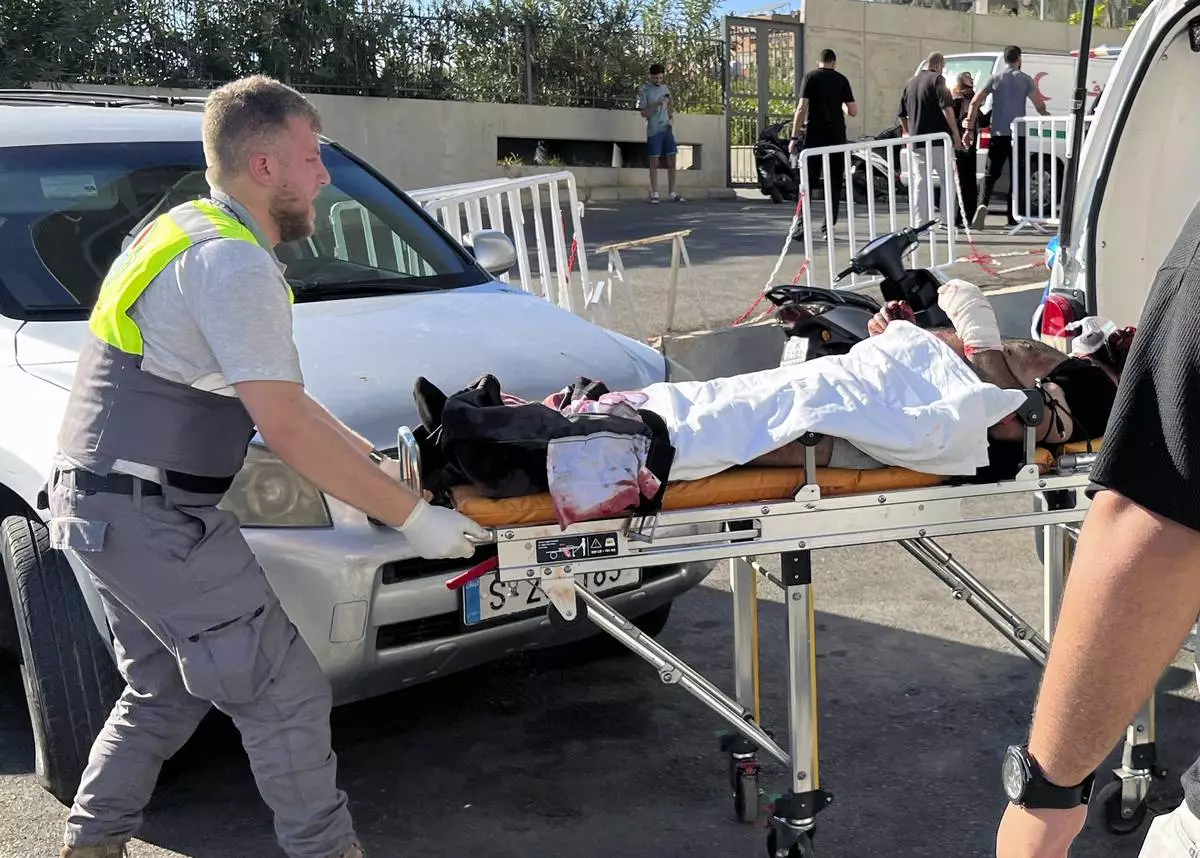
A Civil Defense first-responder carries a wounded man whose handheld pager exploded at al-Zahraa hospital in Beirut, Lebanon, Tuesday, Sept. 17, 2024. (AP Photo/Hussein Malla)
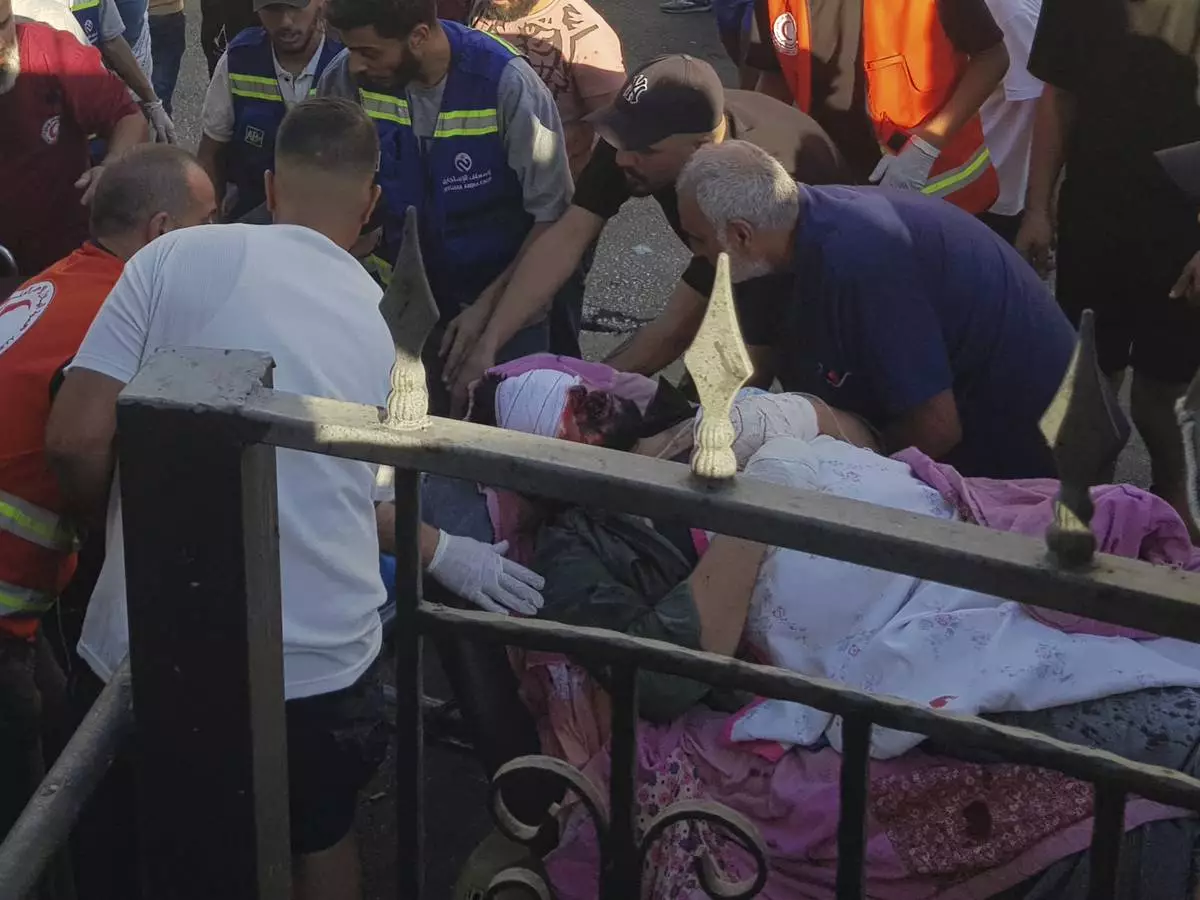
Civil Defense first-responders carry a man who was wounded after his handheld pager exploded, in the southern port city of Sidon, Lebanon, Tuesday, Sept. 17, 2024.(AP Photo)
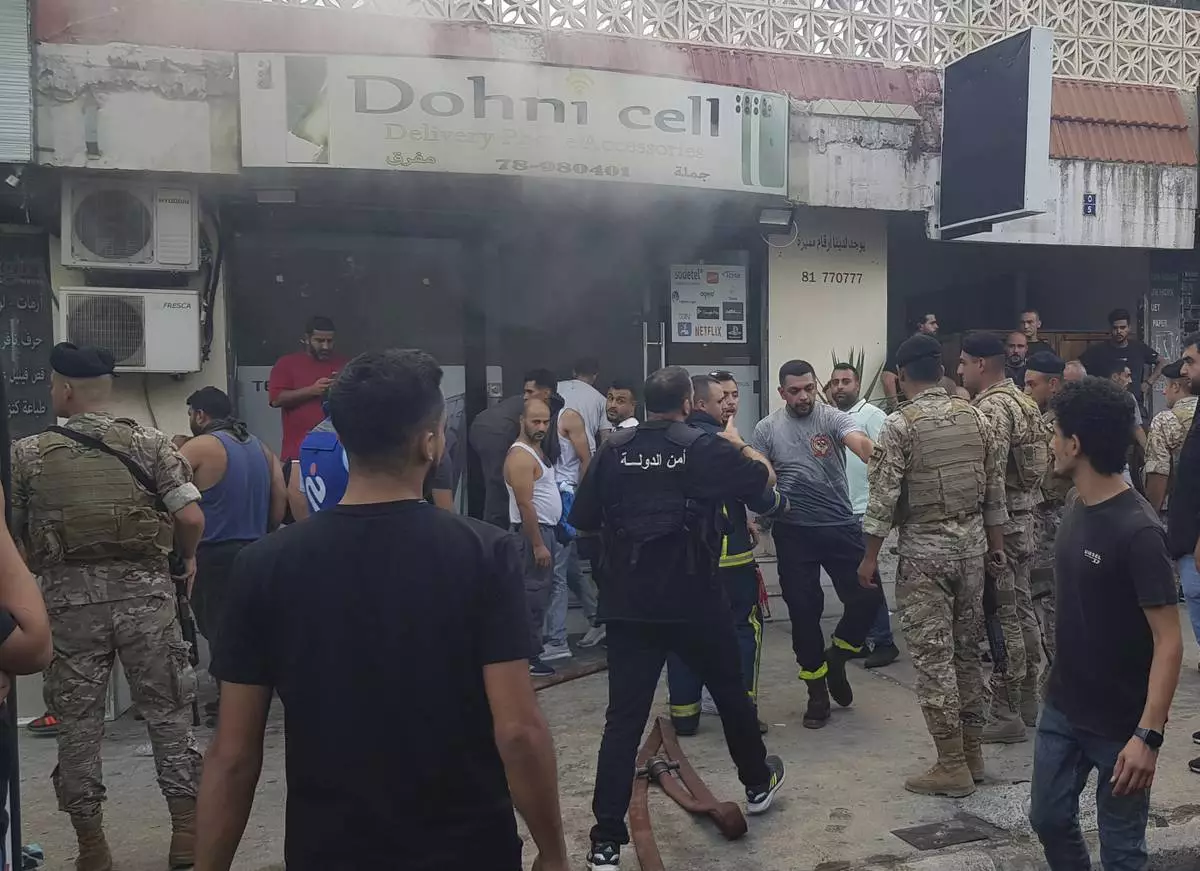
Lebanese soldiers and firefighters gather outside a mobile shop after what is believed to be the result of a walkie-talkie exploding inside it, in the southern port city of Sidon, Lebanon, Wednesday, Sept. 18, 2024. (AP Photo/Mohammed Zaatari)
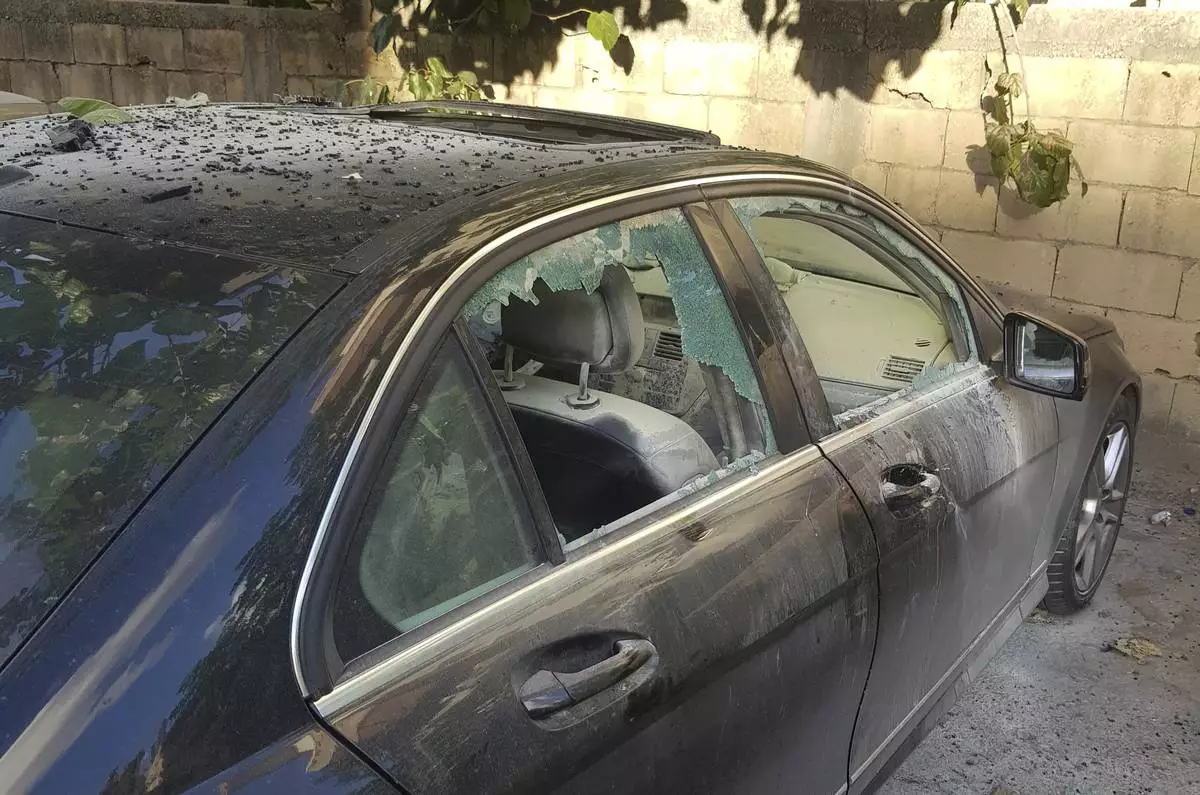
A partly damaged car after what is believed to be the result of a walkie-talkie exploding inside it, in the southern port city of Sidon, Lebanon, Wednesday, Sept. 18, 2024. (AP Photo/Mohammed Zaatari)
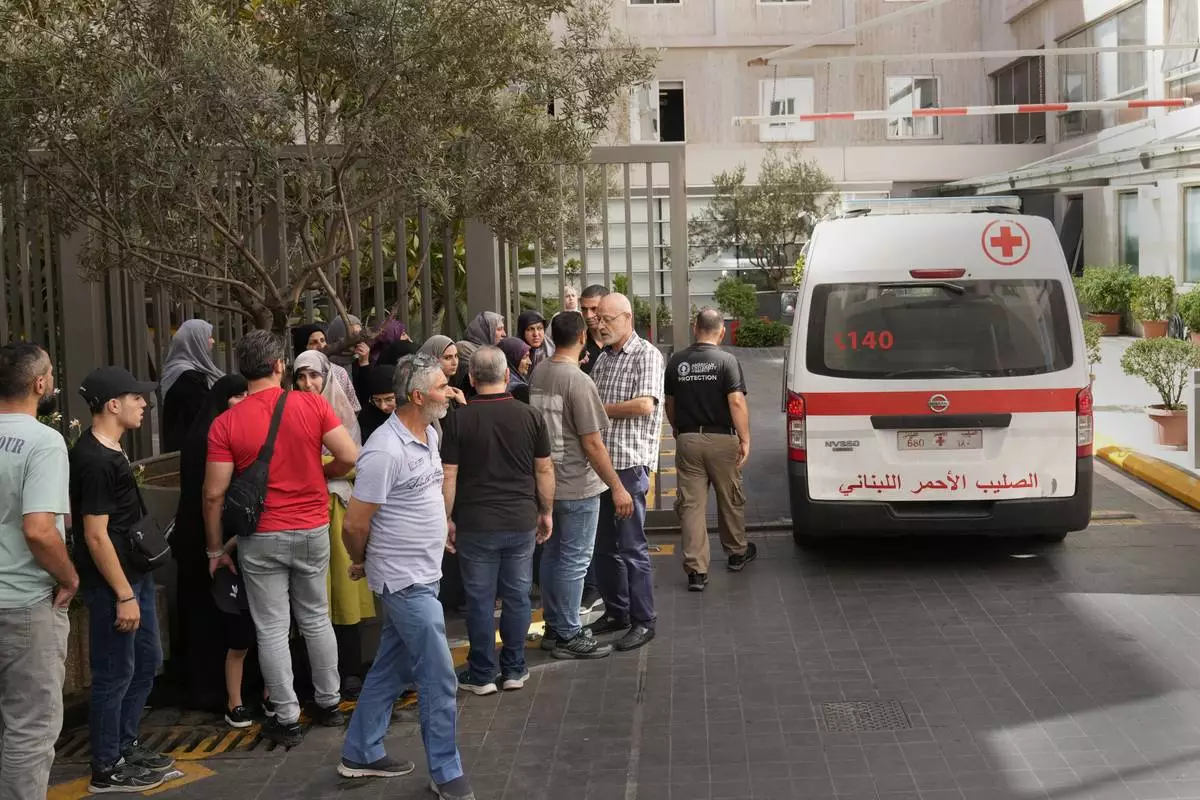
CORRECTS DAY TO TUESDAY WHEN INJURED Lebanese Red Cross ambulance passes next of the families of victims who were injured on Tuesday by their exploding handheld pagers, at the emergency entrance of the American University hospital, in Beirut, Lebanon, Wednesday, Sept. 18, 2024. (AP Photo/Hussein Malla)
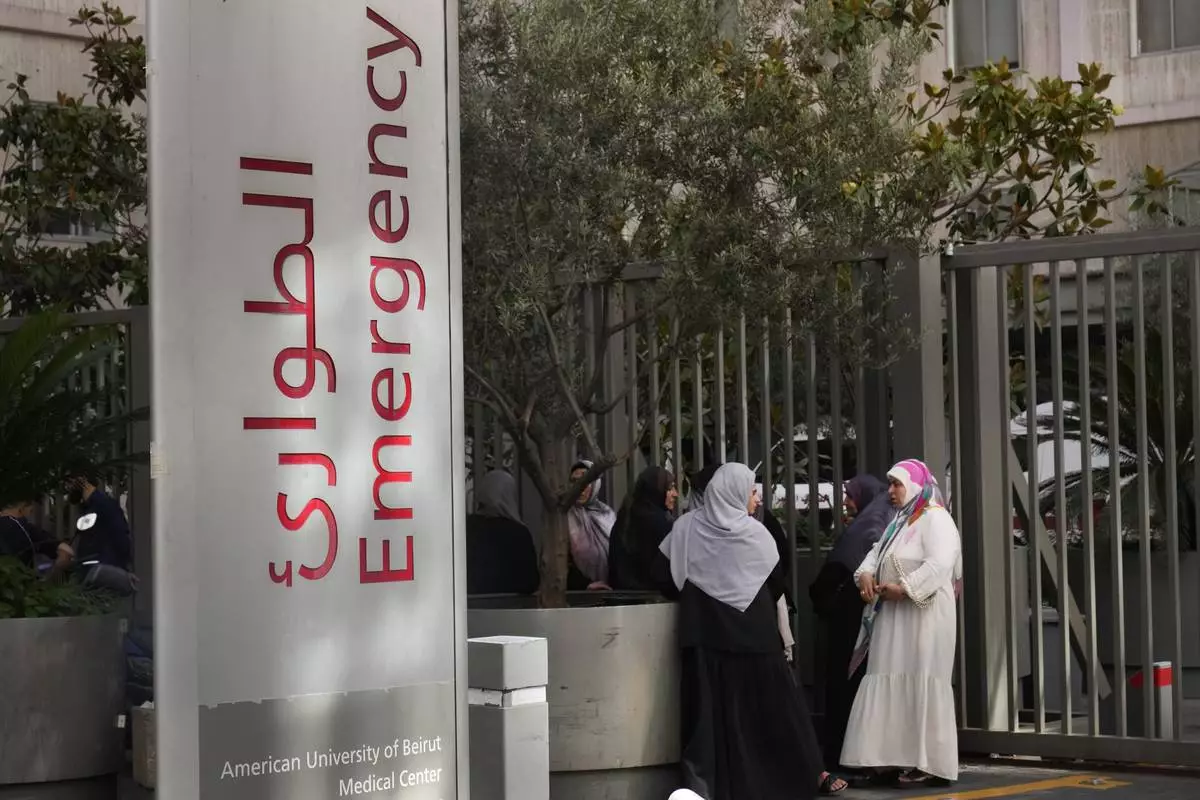
CORRECTS DAY TO TUESDAY WHEN INJURED Families of victims who were injured on Tuesday by their exploding handheld pagers, wait at the emergency entrance of the American University hospital, in Beirut, Lebanon, Wednesday, Sept. 18, 2024. (AP Photo/Hussein Malla)
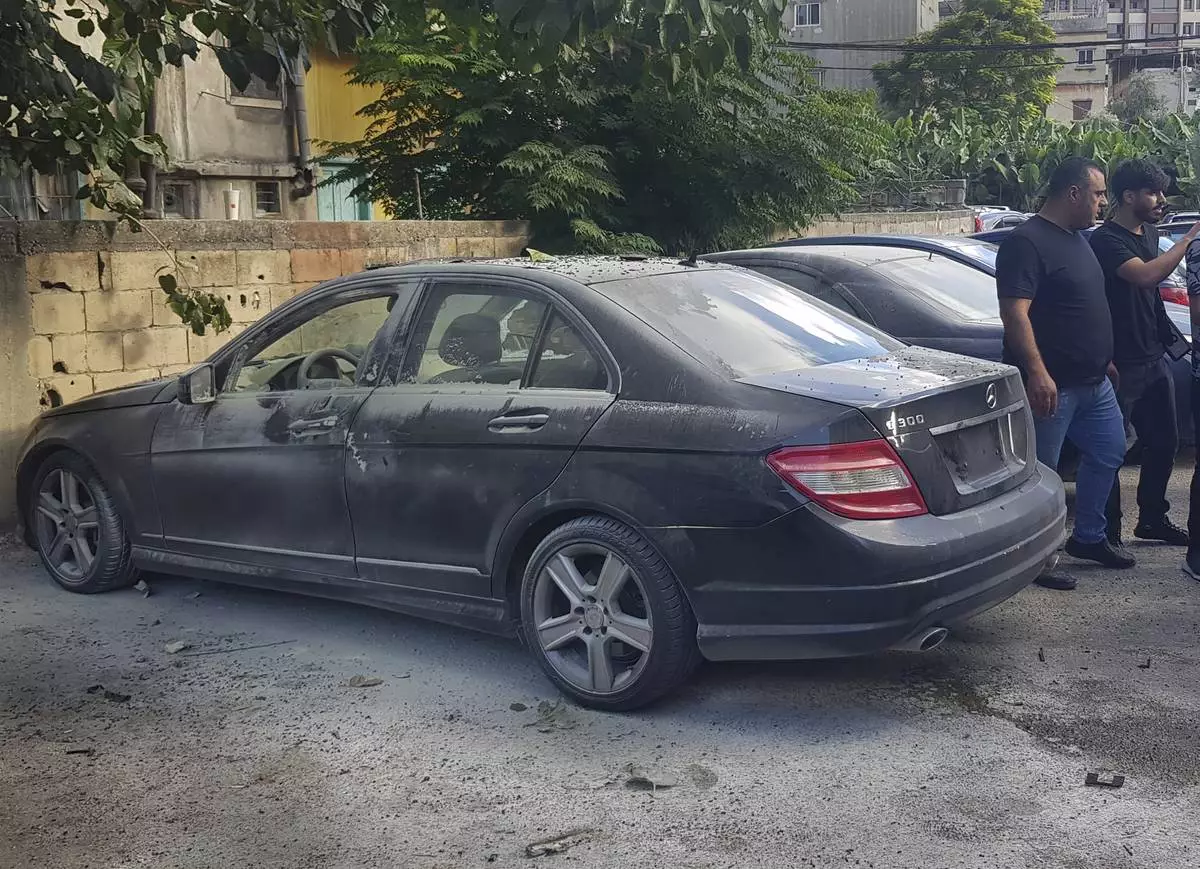
Lebanese security officers stand next of a partly damaged car after what is believed to be the result of a walkie-talkie exploding inside it, in the southern port city of Sidon, Lebanon, Wednesday, Sept. 18, 2024. (AP Photo/Mohammed Zaatari)
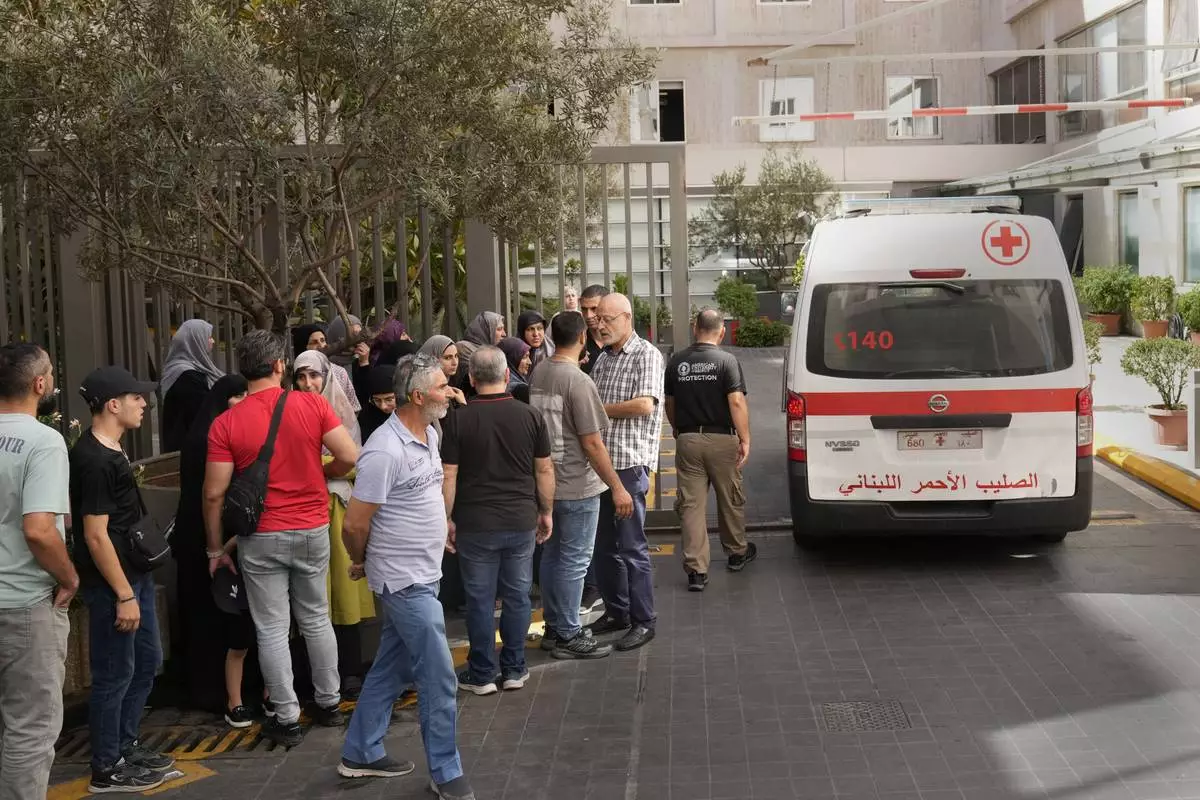
Lebanese Red Cross ambulance passes next of the families of victims who were injured on Monday by their exploding handheld pagers, at the emergency entrance of the American University hospital, in Beirut, Lebanon, Wednesday, Sept. 18, 2024. (AP Photo/Hussein Malla)
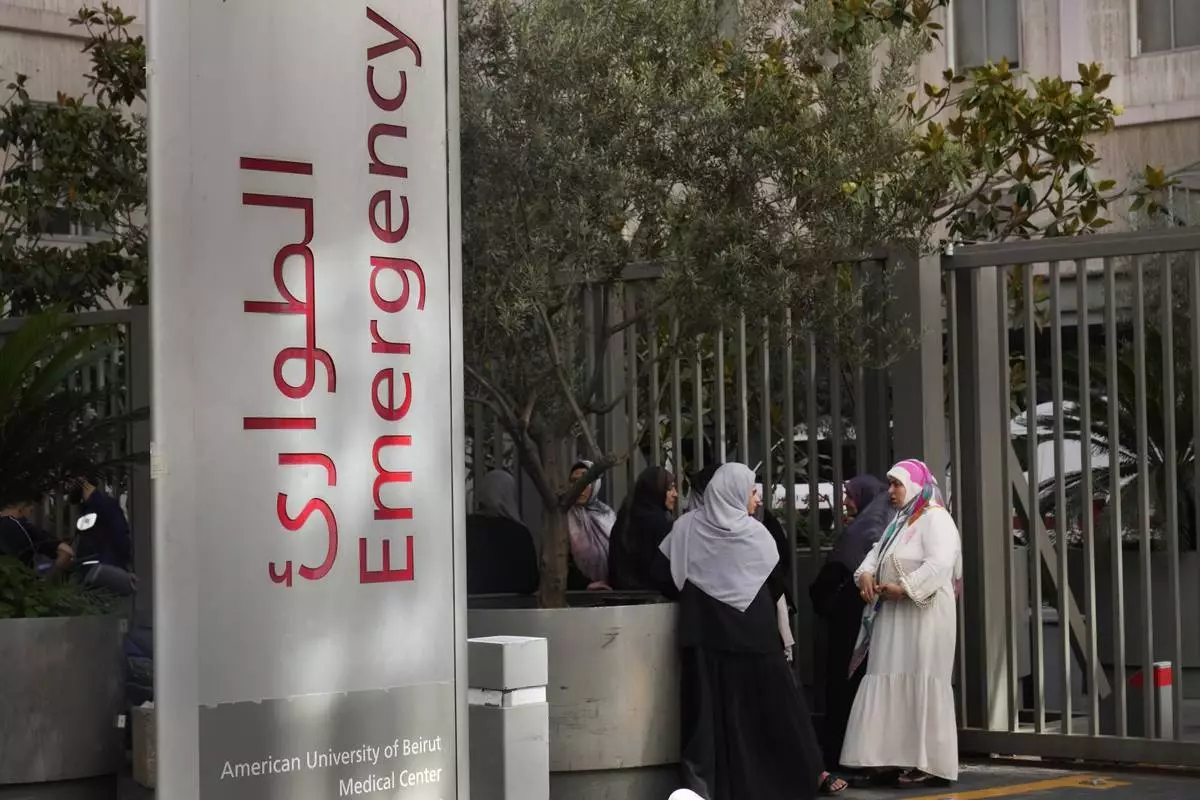
Families of victims who were injured on Monday by their exploding handheld pagers, wait at the emergency entrance of the American University hospital, in Beirut, Lebanon, Wednesday, Sept. 18, 2024. (AP Photo/Hussein Malla)
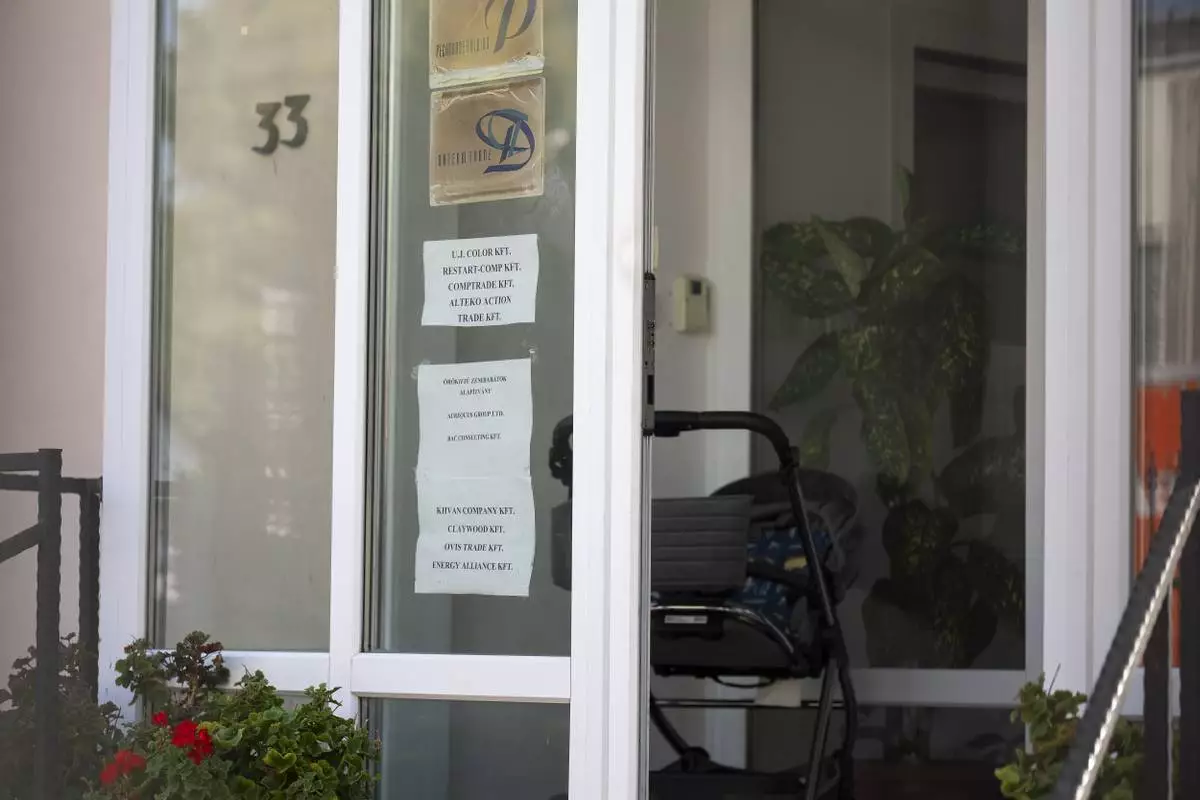
This shows a sing featuring the names of several companies on the door of a house where a Hungarian company that allegedly manufactured pagers that exploded in Lebanon and Syria is headquartered in Budapest Wednesday, Sept. 18, 2024. (AP Photo/Denes Erdos)
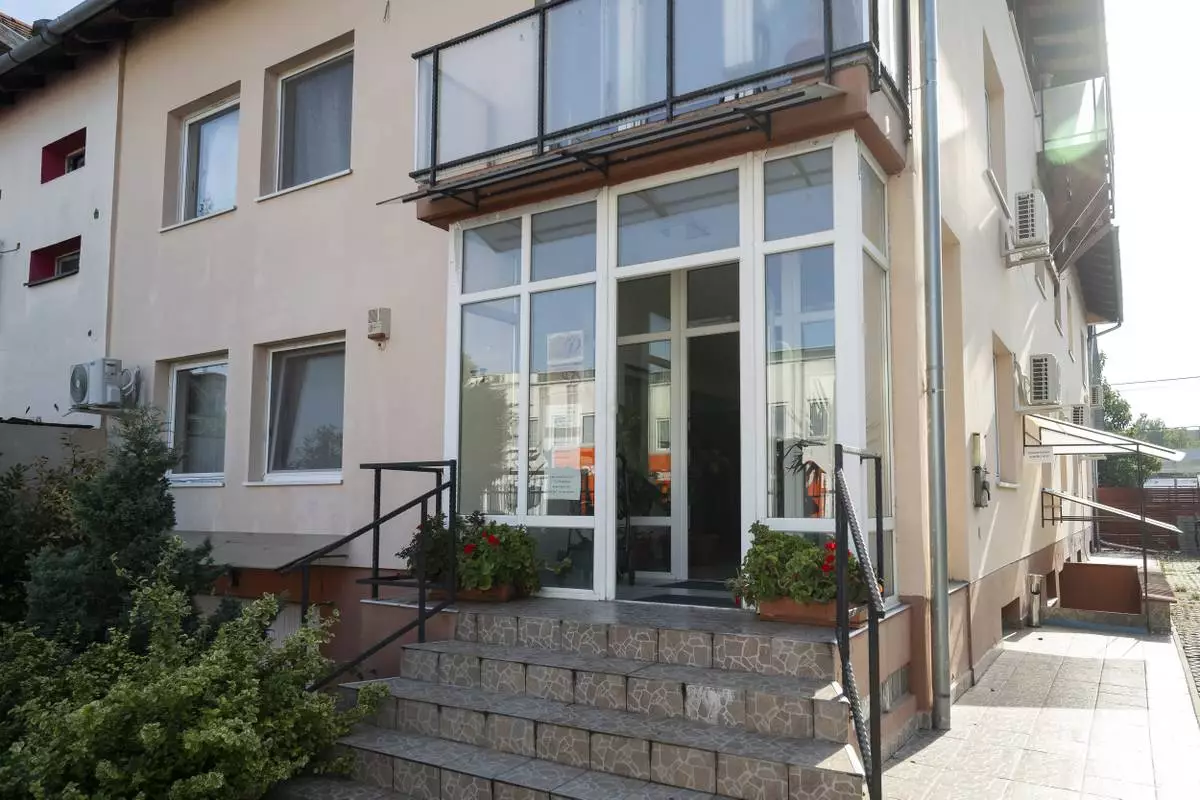
This photo shows a door of a house where a Hungarian company that allegedly manufactured pagers that exploded in Lebanon and Syria is headquartered in Budapest Wednesday, Sept. 18, 2024. (AP Photo/Denes Erdos)
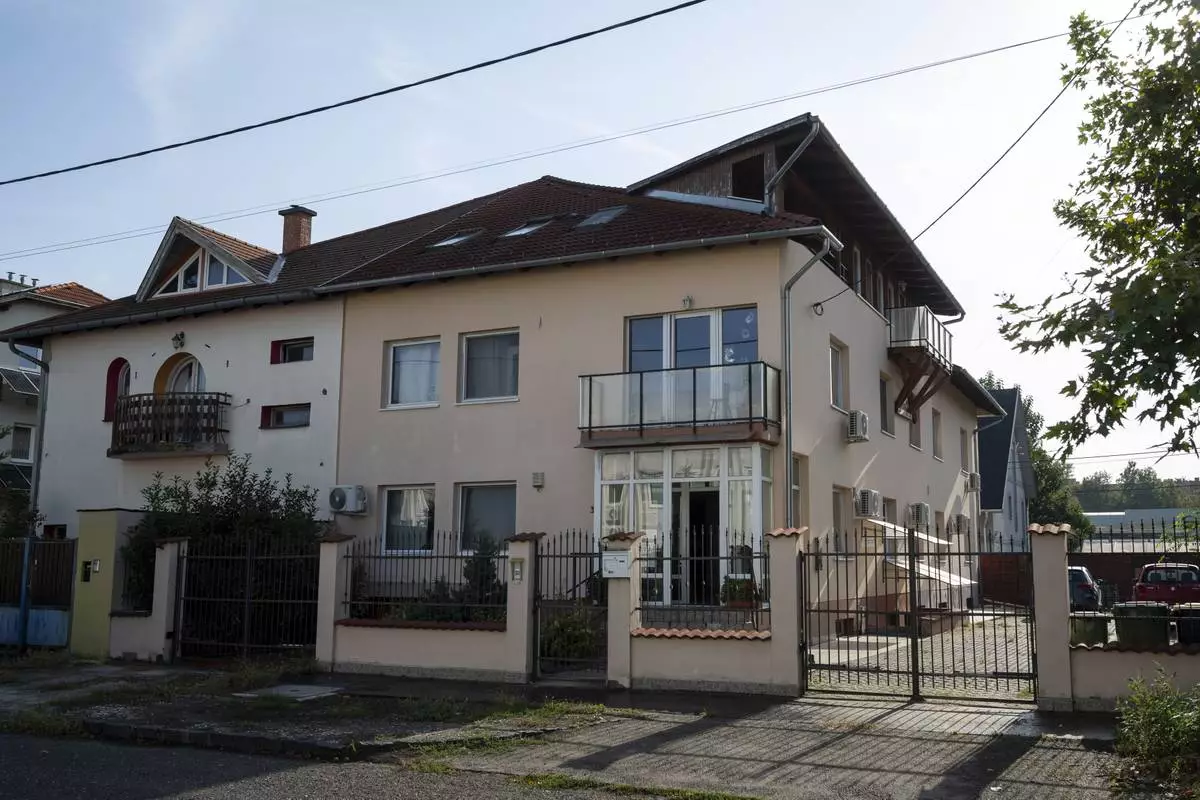
This photo shows a house where a Hungarian company that allegedly manufactured pagers that exploded in Lebanon and Syria, is headquartered in Budapest Wednesday, Sept. 18, 2024. (AP Photo/Denes Erdos)

Civil Defense first-responders carry a man who was wounded after his handheld pager exploded, in the southern port city of Sidon, Lebanon, Tuesday, Sept. 17, 2024.(AP Photo)

Hsu Ching-kuang, chairman of Apollo Gold, talks about the Taiwan company's communication products at the headquarters in New Taipei City, Taiwan Wednesday, Sept. 18, 2024. (AP Photo/Johnson Lai)
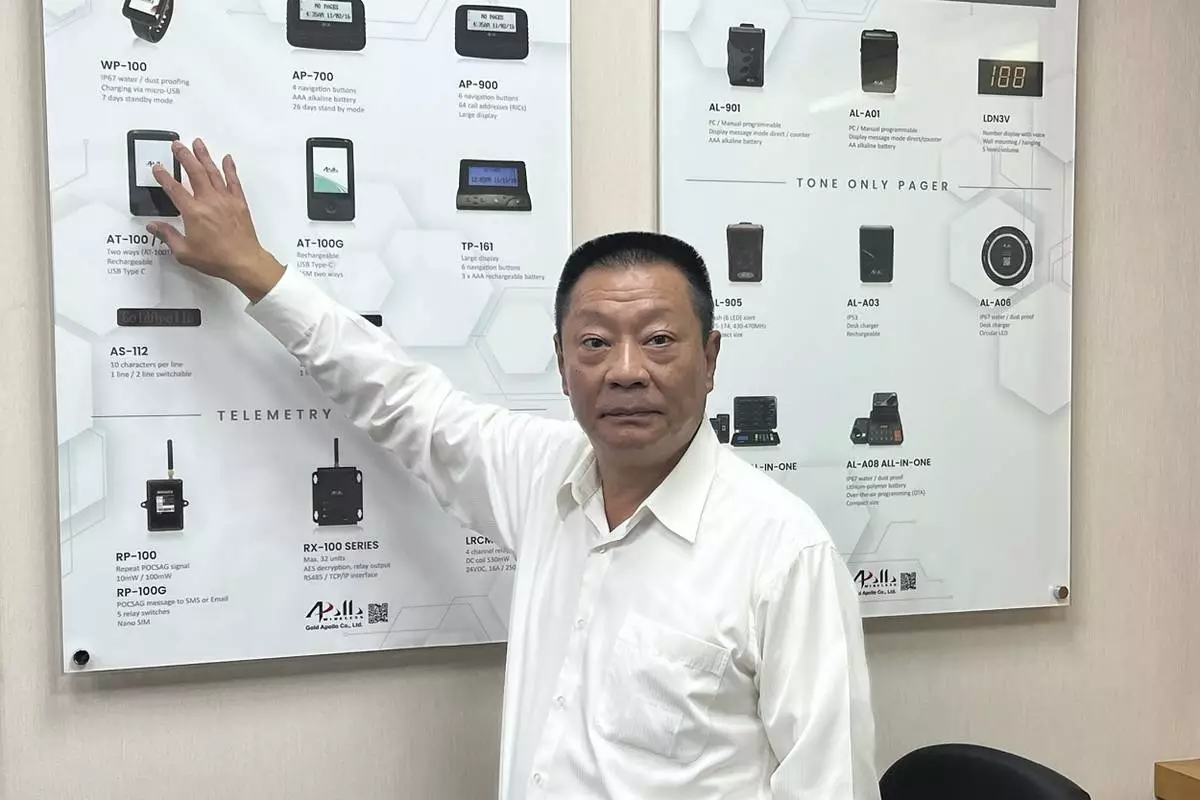
Hsu Ching-kuang, chairman of Apollo Gold, talks about the Taiwan company's communication products at the headquarters in New Taipei City, Taiwan Wednesday, Sept. 18, 2024. (AP Photo/Johnson Lai)
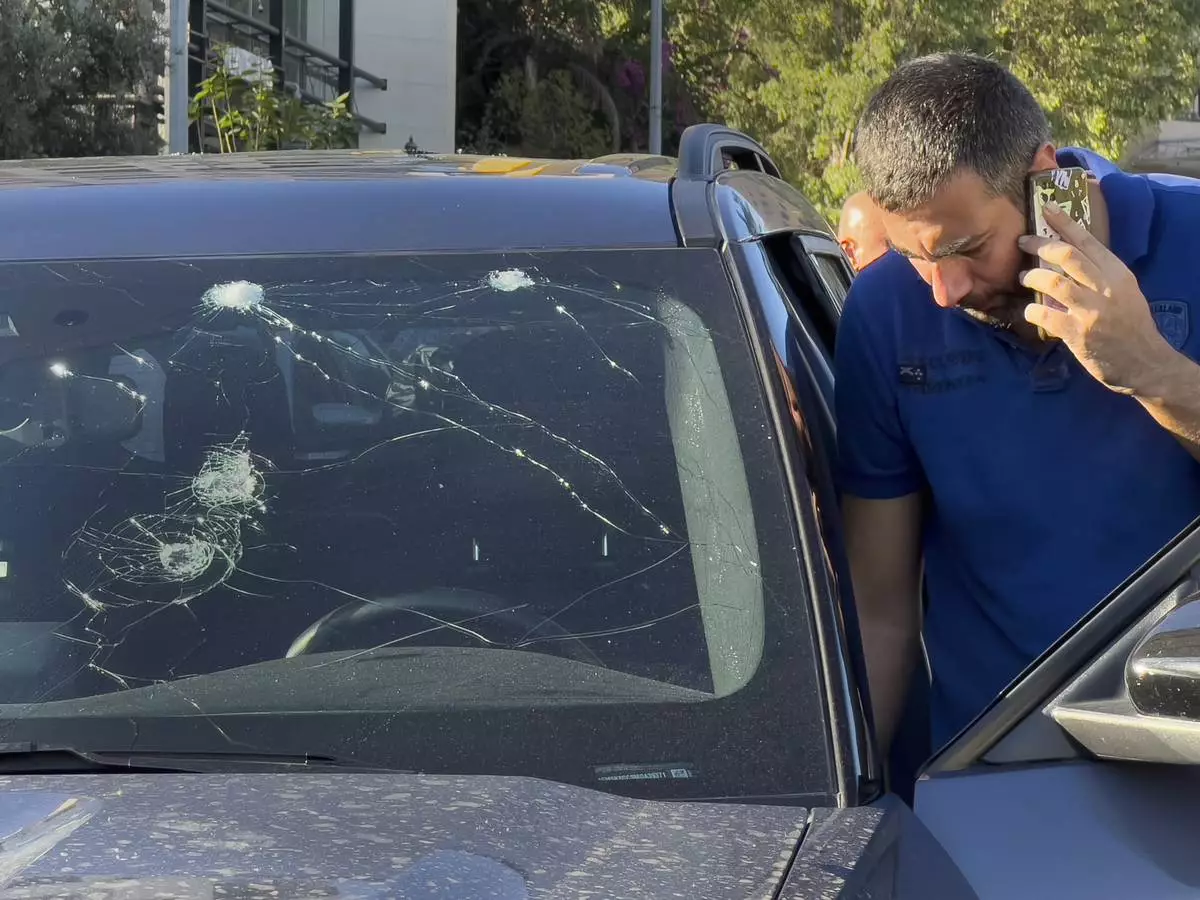
A police officer inspects a car in which a hand-held pager exploded, in Beirut, Lebanon, Tuesday, Sept. 17, 2024. (AP Photo/Hussein Malla)
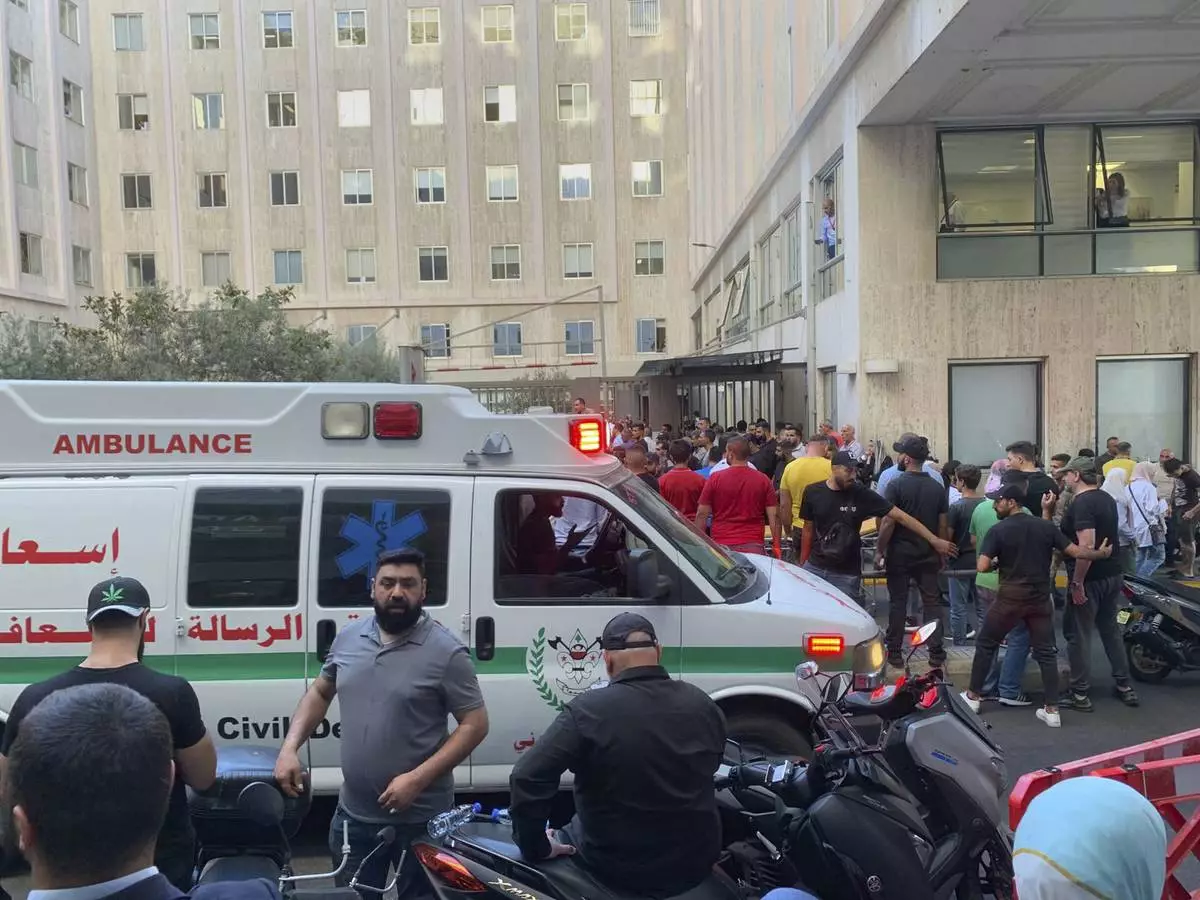
People gather outside the American University hospital after the arrival of several men who were wounded by exploded handheld pagers, in Beirut, Lebanon, Tuesday, Sept. 17, 2024. (AP Photo/Bassam Masri)
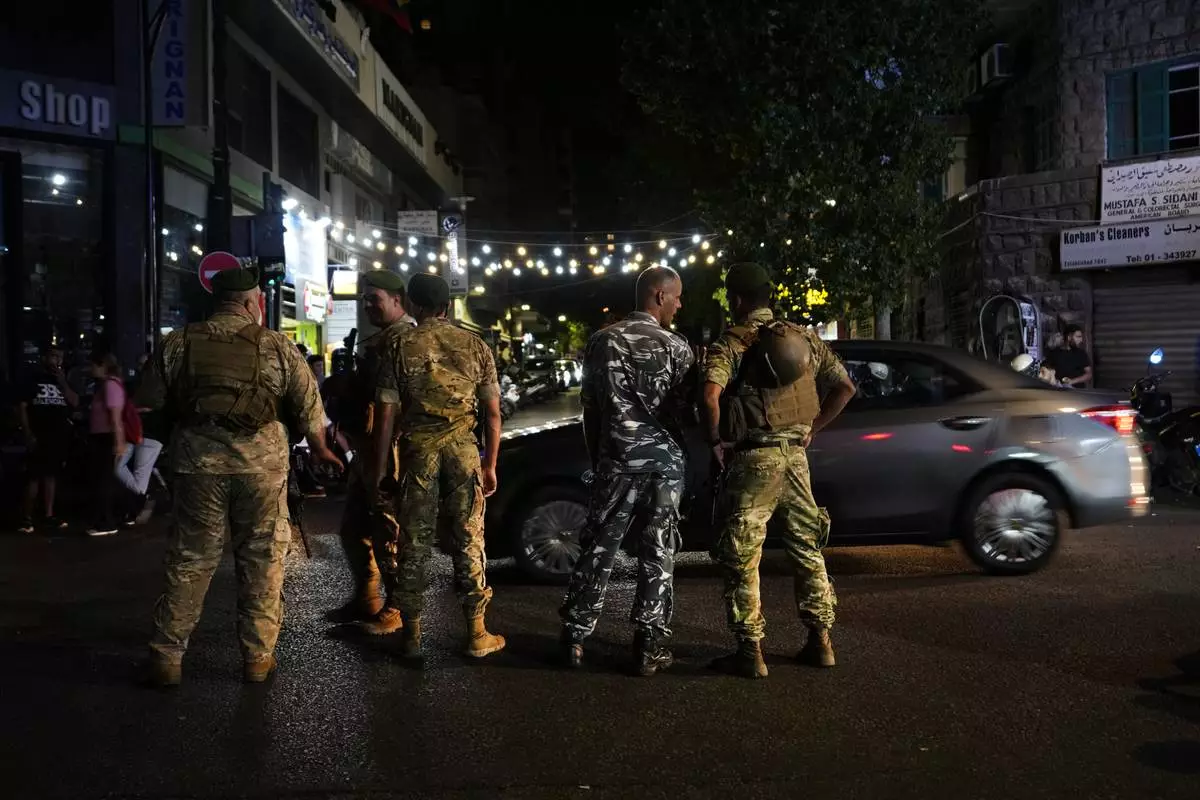
Lebanese soldiers stand guard at a street that leads to the American University hospital where they bring wounded people whose handheld pager exploded, in Beirut, Lebanon, Tuesday, Sept. 17, 2024. (AP Photo/Hassan Ammar)






















